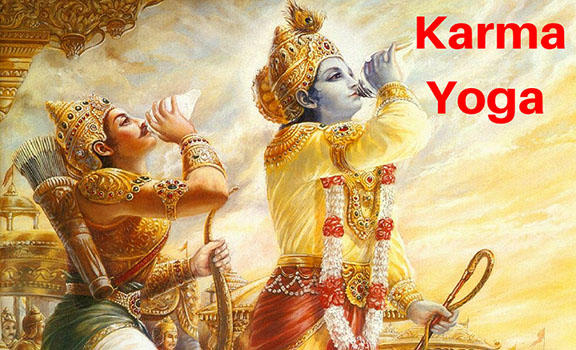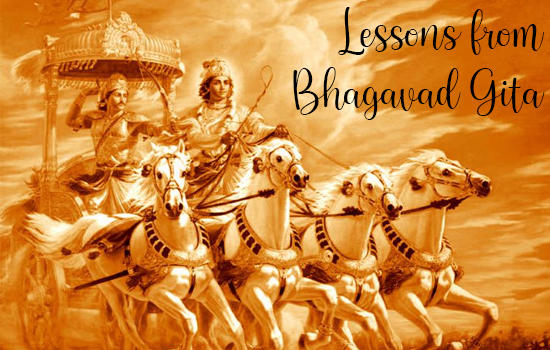The Bhagavad Gita is the Mahabharata's central source of wisdom. Despite being written as a Gita (song), it is typically read nowadays. The great battle of Kurukshetra, the conflict between the two branches of the royal line, is described in the Gita as a discourse between Lord Krishna and the royal warrior prince, Arjuna. The Bhagavad Gita is one of the most extensive religious texts ever produced in human history. The phrase "Bhagavad Gita" is understood to indicate the music of the Spirit, the song of the Lord. The book addresses every facet of life and provides all information.
The soldiers and kings of the two branches of King Kuru's ancient royal dynasty were positioned in opposition to one another in this impending conflict. King Kuru was the founder of this ancient royal dynasty. The conflict between the cousins of the Pandava and Kaurava dynasties was about which monarch, Pandava King Yudhisthira or Kaurava King Duryodhana, should have the right to reign. Yudhisthira and his Pandava allies were at war to regain the throne after Duryodhana had usurped it. Arjuna, a Pandava warrior, and Lord Krishna have a discussion in the Bhagavad Gita about how true wisdom in trying circumstances leads to spiritual freedom and blessings.


Important Lessons from the Gita for the Youth
Understanding the Bhagavad Gita's timeless principles can give us a profound understanding of the hows and whys of existence. Additionally, incorporating Gita's teachings into our daily lives will promote the practice of self-reflection and point us in the direction of a more practical outlook on life.
Learn Tolerance and Forgiveness
Tolerance teaches us to remain calm in the face of life's challenges and to refrain from employing force, especially when provoked. We are able to absolve wrongdoing and get rid of resentment with the aid of forgiveness. Both of these traits are essential for fostering relationships, growing empathy and love, and overcoming controversial ideas. These two principles served as the cornerstone of the bond between the Pandava brothers.
Never Underestimate the Power of Faith
The three strongest powers inside a person are faith, trust, and belief. A young mind that is full of faith and conviction has the ability to withstand external sources of danger or dread. It's time to reflect if you lack confidence in your ability to complete whatever activity you set out to do. The Gita will instruct that having steadfast faith is the jewel of the heart. Sometimes it may be challenging to maintain faith. However, it's in these situations that you must maintain your composure in order to accomplish the impossible. Never forget that experiencing the whole range of emotions without compromising your faith is the only way to truly grow.
Live Life to the Fullest
Whatever the circumstance, youngsters should live life to the fullest, according to Bhagavad Gita. Explore all there is to explore both inside and outside of yourself if you want to live life to the fullest! Consider whether you are doing everything you can to fulfill your role for a while. Living a happy life is about accepting and going along with whatever happens. Give the most pristine, disciplined version of yourself to life. You will eventually receive something quite fantastic in return.
Change is Natural
Everything is temporary. Things and situations shift. Change is the only constant, as cliché as that may sound. Young, impressionable minds, however, are resistant to change. It is essential to realize that change without progress is impossible, and vice versa. Be patient even if things go slowly. Making a little progress every day leads to incredible outcomes.
Nothing in this world is permanent, including success and failure, as best demonstrated by the example of day changing into night and then back into day again. Those who have tried and failed should draw inspiration from this example and keep trying. People who are going through difficult circumstances should not give up until they can turn the tide.
Learn to read, write, and speak in Hindi with Hindi classes near me on Superprof.

Having the Right Perspective
Just as the battle of Kurukshetra was about to start, Arjun felt lost and discouraged. He didn't fight because he couldn't bear what would happen if he did. Understanding what we should do, why we should do it, our place in the bigger picture, and how to approach things are all dependent on how we perceive things.
Unleash Your Inner Self
Unbridled energy and restlessness are traits shared by millennials and Generation Z. Because of this, inner strength is frequently hampered by mental chaos. The Bhagavad Gita encourages people to tap into their inner strength, especially when they are feeling helpless. Ever-victorious people are those who consistently overcome difficult situations by drawing on their inner power. If you ever experience that, remember that you are not alone. Take a moment and examine your soul. The universe is enormous!
Meditation Unlocks Inner Strength
Meditation helps you unveil and embrace the real you. The same lesson was imparted 5000 years ago in the Bhagavad Gita. Through yoga and meditation, one can conquer the internal conflict that never ends. The Bhagavad Gita's 10th chapter, Vibhuti-Vistara-Yoga, claims that when one meditates, marvels take place in life. Give miracles a chance to occur with a little devotion and attentiveness.
Free the Mind from Anger
One of the basic feelings that every living being experiences is fear. Fear develops in people when they lack knowledge and are unable to control their emotions as a result. Therefore, persevere in your quest for knowledge and understanding. Because of this, you will be able to understand the unknown and get over your fear and reluctance.
It's Value of Being Mentored
Mentors are dependable guides who take in every uncensored conversation and direct the mentee in the appropriate direction. The value of having a mentor has been underlined heavily throughout the Gita. A teacher or professor isn't always considered to be a mentor. The person who will always be your mentor and accept you for who you are, without passing judgment, could be your parents, siblings, or best friend.
The Art of Staying Calm
Our ability to regulate our emotions, maintain our composure and optimism in both good and terrible situations, and manage stress are all benefits of having a calm mind. Additionally, it enables us to think clearly, consider our options, and focus our energy on productive activities. Our ability to maintain our composure is greatly aided by the realization that change is unavoidable.
Since anger impairs our ability to think, confusion and disorder result. It reduces our mental acuity and keeps us from achieving our objectives. A painful experience causes us to think negatively and drives us to do damaging things. In the Mahabharata, Duryodhana's rage stopped him from acting rationally, which led to him starting a war with his cousins.

Focus on Your Actions, Not the Results
The younger generation has a tendency to focus more on outcomes than actual labor. The phrase Nishkama Karma appears frequently in the Gita. It means to act without thinking about the consequences. Instead of remaining ignorant, the goal is to concentrate more on work. As soon as they don't see immediate results, people give up on things. This ultimately results in fruitless events. Act as a true Karmayogi to bring out the best in you.
Promoting the Welfare of Others
The majority of our acts are committed purely for our own advantage. We hardly ever consider how our actions might influence others. This way of thinking causes us to act selfishly and isolates us from others around us. However, selflessness enables us to recognize that we are all members of one big family (Vasudhaiva Kutumbakam). Our acts ought to improve the planet and strengthen our relationships with the people around us.
The Bhagavad Gita is a compilation of various notions and remedies for every state of mind. The Bhagavad Gita was a religious book that Mahatma Gandhi used to read and be inspired by. In fact, the Bhagavad Gita is regarded as a manual for living a fulfilling life by people from various nations and religions around the world. It's crucial to note for the readers that adopting Bhagavad Gita's teachings won't convert you to Hinduism or Christianity. It discusses human tribulations and feelings while serving as proof that life exists. Therefore, whether you are a theist or an atheist, you have no connection to the Bhagavad Gita's teachings. The words of the Gita apply to every being for a better future.
Understand more about the Bhagavad Gita when you improve your Hindi skills in Hindi online classes on Superprof.

Summarise with AI:















